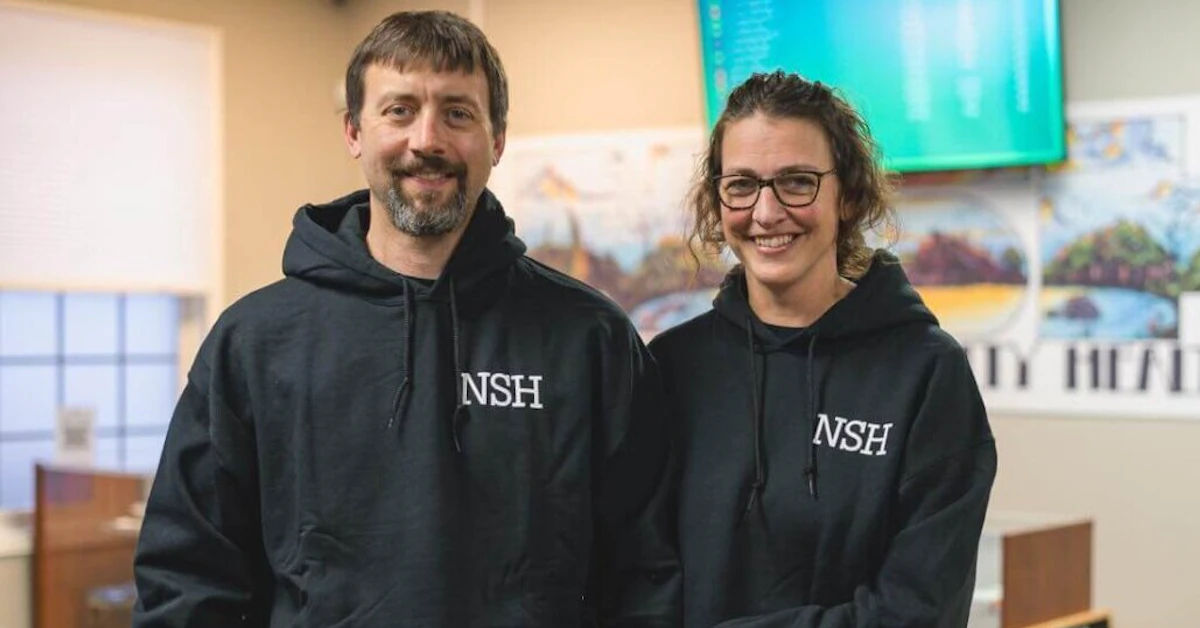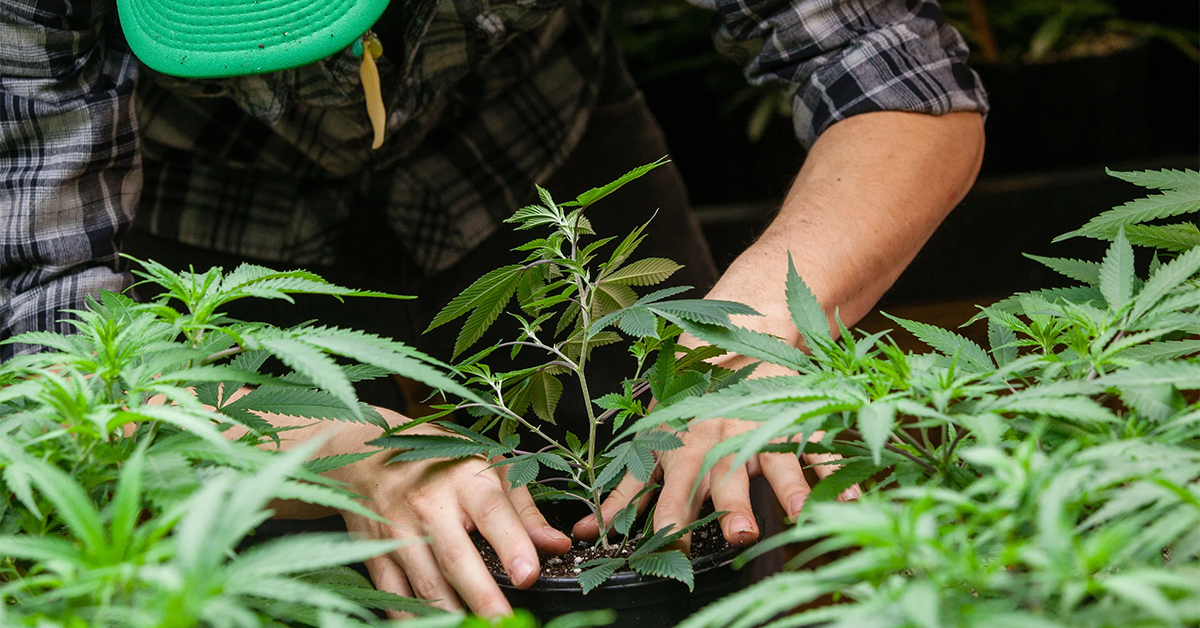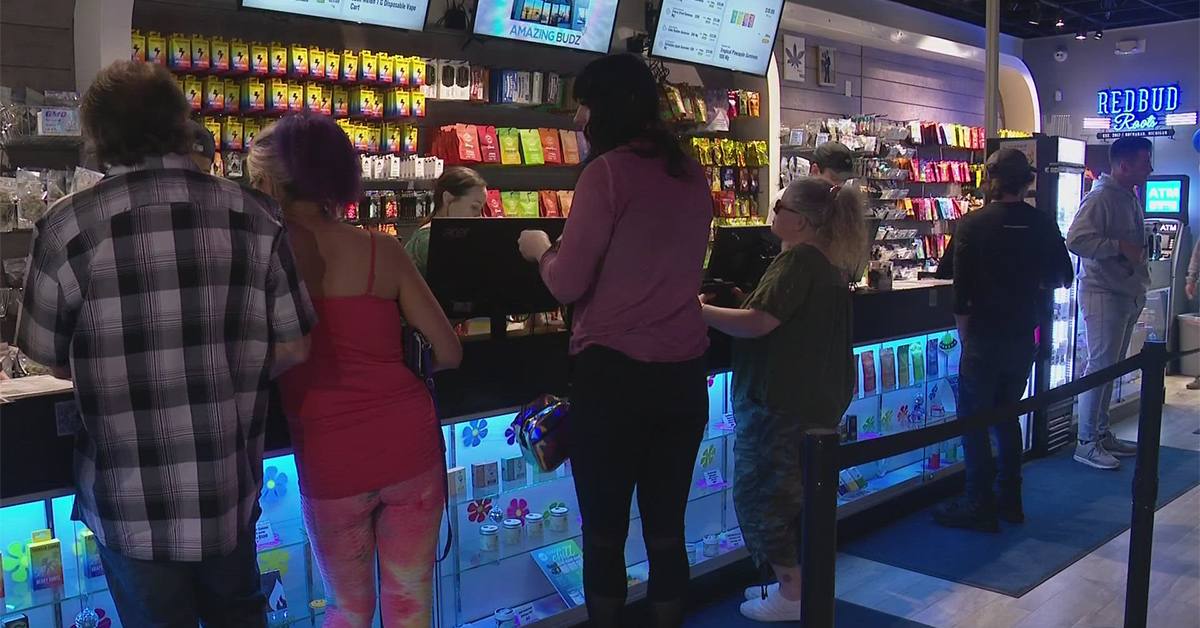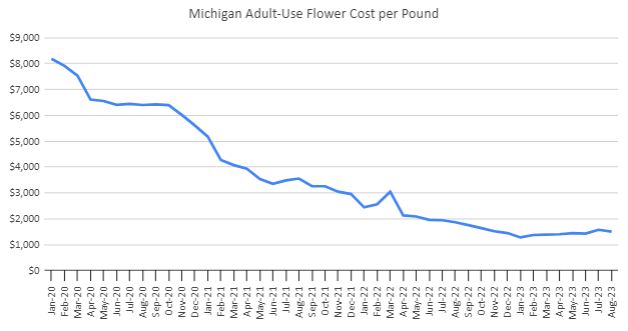A 'Mom and Pop' Legacy: Celebrating 10 Years of Northern Specialty Health

Nestled amid the breathtaking beauty of Michigan's Upper Peninsula lies a gem not just for nature enthusiasts, but for cannabis aficionados as well. The region, spanning a massive 16,000 square miles, is a beacon for those seeking the tranquil embrace of unspoiled wilderness.
But besides its natural allure, the Upper Peninsula is evolving into a hotspot for cannabis enthusiasts. Post the 2018 legalization, the region now hosts over four dozen licensed dispensaries, accompanied by numerous cultivation and processing facilities. A stark contrast to just a few years ago when Northern Specialty Health was the lone dispensary serving both locals and over a million annual tourists.
Celebrating its tenth anniversary this year, Northern Specialty Health stands as a testament to family-owned business success amid burgeoning competition. Owner Penny Milkey, in an exclusive with Michigan Marijuana News, delves deep into the journey of their "Mom and Pop Cannabis Shop."
Journey into Cannabis
Unlike many in the industry, Penny didn't set out with dreams of cannabis entrepreneurship. She came from a teaching background, while her husband Ryan was an electrician. Their foray into cannabis was born out of necessity after Ryan suffered a severe four-wheeler accident in 2007. Discovering the therapeutic potential of cannabis, they started as medical marijuana caregivers before taking the reins of Northern Specialty Health in 2013. Their mission? Ensuring patients had reliable access to their medicinal needs.
Challenges and Triumphs
For Penny, entering an emerging industry wasn't without its hurdles. Advocating for cannabis acceptance involved attending numerous City Council and Planning Commission meetings. But the effort was worth it. A decade later, with their unflinching commitment to patient welfare over profit, and a strong focus on locally-sourced quality products, the Milkeys have carved out a niche for themselves.
Insights and Favorites
Cannabis in the Upper Peninsula, Penny notes, is distinct from Lower Michigan. Trends take longer to trickle up, maintaining a unique marketplace dynamic. And what's flying off the shelves? Unsurprisingly, flower remains a top choice among Yoopers.
As for personal favorites, Penny is a fan of pre-rolls. Particularly, the infused pre-rolled joints by Element, and strains like Mango Haze by Forté and Mafia Funeral by Redemption.
When asked about quirky strain names, Penny recalls the amusingly named "Adios, Motherf—ers," though she ensures they steer clear of anything too controversial.
Celebrations & Exclusive Offers
This December promises to be a month-long celebration for Northern Specialty Health's decade-long journey, with exciting promotions on the horizon.
As Penny fondly notes, visitors to the Upper Peninsula seeking a genuine, homegrown cannabis experience will find no better haven than Northern Specialty Health in Houghton. It's not just about the product; it's about the heart behind it.
Michigan vs. Los Angeles: A Comparative Analysis of Their Cannabis Economies

In the ever-evolving landscape of the U.S. cannabis industry, two prominent players stand out - Michigan and Los Angeles. Their journeys, although intertwined in the broader narrative of marijuana legalization, present distinct challenges and opportunities.
Legal Foundations of Cannabis Trade
Central to the vibrancy of the cannabis trade is the legal framework. Michigan welcomed legal cannabis for both medical and recreational purposes in 2018, following a public vote. The state prides itself on a structured regulatory system, ensuring organized operations from dispensaries to cultivators.
On the other hand, Los Angeles has been a key player in California's cannabis narrative. The state pioneered medical marijuana legalization in 1996 and expanded to recreational use by 2018. Yet, LA's labyrinthine local regulations, despite facilitating a rich marketplace, have often perplexed businesses and consumers.
Economic Impacts and Market Dynamics
In 2022, Michigan's cannabis trade soared, garnering sales of over $2 billion, as per the Michigan Marijuana Regulatory Agency. This underscores Michigan's unwavering appetite for cannabis products.
Contrastingly, Los Angeles, with its demographic advantage and early legalization, clocked a staggering $5.3 billion in cannabis sales in the same year. However, its industry faces fragmentation due to its competitive environment and intricate regulations.
The Spectrum of Industry Players
Michigan's cannabis industry is marked by an influx of small, locally-owned businesses, mirroring the entrepreneurial spirit in new cannabis markets.
Conversely, Los Angeles showcases a spectrum of players - from budding businesses to industry titans. While this spells fierce competition, it also raises eyebrows over potential corporate monopolization.
Tackling Challenges, Seizing Opportunities
Navigating the cannabis industry is no mean feat. Michigan's hurdles include equitable license distribution and environmental implications of cannabis farming. These reflect the teething problems of emerging cannabis economies.
Los Angeles grapples with its own set of challenges. A convoluted licensing procedure and an unchecked illegal market are primary concerns. Addressing these is crucial for a balanced industry catering to both entrepreneurs and consumers.
Yet, the horizon is bright. Both Michigan and Los Angeles are ripe for innovations in product design, user experience, and medicinal utility. Their potential to metamorphose into global cannabis epicenters is palpable.
Final Thoughts
Michigan and Los Angeles, while traversing their unique cannabis journeys, contribute significantly to the broader cannabis narrative. Michigan's orderly regulations and blossoming local enterprises hint at a promising, inclusive industry. Meanwhile, Los Angeles, with its monumental market presence, is poised to be a trendsetter in cannabis innovations.
The onward journey demands collaboration among policymakers, industry experts, and stakeholders. By addressing emerging challenges, Michigan and Los Angeles can maximize the socio-economic benefits of cannabis, ensuring their communities thrive in this green revolution.
Historic Big Rapids Building Gets New Life with Triad of Entertainment, Coffee, and Cannabis

Marc Robert, a local entrepreneur, has infused new life into the historic building at 120 S. Michigan Ave. above Shooter's Bar & Grill, offering a fusion of a marijuana dispensary, coffee hub, and an entertainment venue. Here's a deeper dive into this pioneering venture:
The Luckyspot Dispensary
Originally known as Lucky's, the space has been revamped and renamed to Luckyspot. This full-service marijuana dispensary partners with Roasted Insomniac, a coffee nook offering baked delicacies and diverse coffee blends.
Acacia Place - More Than Just a Venue
Replacing the historic Masonic Temple lodge, the newly christened Acacia Place is set to host events ranging from concerts and weddings to musicals and grand group gatherings. Robert's inspiration traces back to his student days at Ferris State University when he frequented this place for fraternity events. "The building's energy is palpable, and it has a rich history. It's where the first two Ferris State University class graduations took place. We aim to preserve and celebrate this legacy," remarked Robert.
Roasted Insomniac – A Retro Coffee Corner: Positioned to serve the visitors of the dispensary, this cafe will offer an array of baked goods and coffee. An additional nostalgic touch? A TV hooked up to 10,000 retro games.
Upcoming Events and Offers: Acacia Place is all set to host rapper Sada Baby on October 21st at 8 p.m. General admission tickets are priced at $99, and VIP tickets, offering a sound check and meet & greet, come at $149. Ticket holders also get tempting offers on cannabis products and accessories.
The dispensary will have its grand opening at 9 a.m. on September 25th, with deals and top-shelf brands awaiting customers.
Community & Collaboration
With a seating capacity of 225, which Robert hopes to expand soon, the venue aims to integrate with Ferris State University and the local music scene. Plans for student internships to manage the venue are also on the horizon. Robert is keen on contributing to local initiatives, supporting entities like Muskegon State Park, the Muskegon Humane Society, and Ferris State University, among others.
"My primary goal is to enrich Big Rapids' culture," Robert expressed. "Culture intertwines with music, art, entertainment, and community. I hope to pass down a vibrant community space to future generations."
For details on the Luckyspot, check out luckyspotusa.com. To stay updated on events and availability at Acacia Place, head over to acaciaplacelive.com.
Michigan's Green Gold Rush: Booming Sales, Falling Prices

Michigan's cannabis industry experienced a significant milestone in July, with sales surpassing the $276 million mark, encompassing both recreational and medical uses. These figures, reported by the Michigan Cannabis Regulatory Agency, suggest a promising trajectory for the state, with projections indicating that revenues could eclipse $3 billion for the first time this year. Should this trend continue, Michigan is poised to become the second-largest cannabis market in the country, trailing only California.
Despite the booming sales, challenges persist for retailers, many of whom grapple with thinning profit margins. One of the main culprits? A continuous decline in marijuana prices, despite a modest recent uptick.
The regulatory framework in Michigan allows the Cannabis Regulatory Agency to grant new licenses for growers every month. According to Beau Whitney, a senior economist at the National Cannabis Industry Association, this frequent licensing is a significant factor causing the current struggles for retailers. Whitney describes the situation as a "race to the bottom," where the sheer volume of competition is driving prices to unprecedented lows, a trend that is unsustainable in the long run.
In a detailed breakdown of July's licensing, the state processed 97 applications, granting 87 new licenses. A significant portion, 17 licenses, went to class C growers, who, under state regulations, are permitted to possess up to 1,500 plants.
Currently, Michigan boasts 2,080 active licenses for recreational cannabis. Intriguingly, over half of these licenses belong to class C growers or retailers.
Jerry Millen, proprietor of The Greenhouse dispensary located in Walled Lake in western Oakland County, provides further insights into the challenges the industry faces. He highlights the struggles of smaller, independent retailers facing stiff competition from major corporate entities, which, armed with deeper pockets, can afford to engage in aggressive pricing strategies, often to the detriment of smaller establishments.
Green Peak Industries stands as a testament to these market dynamics. This Dimondale-based cannabis company, with its Skymint-branded dispensaries scattered across the state, is known for its competitive pricing – typically below the average $99 per ounce as indicated by the Cannabis Regulatory Agency's report. However, despite their aggressive expansion, having opened over 20 locations since their debut in Ann Arbor in 2018, the company currently finds itself under receivership, with allegations of a staggering $127 million debt.
Following the legalization of marijuana in Michigan in 2018, a 10% excise tax was introduced, compounded by an additional 6% sales tax. This, coupled with high production costs and an oversaturated market, paints a complex picture for retailers – albeit a favorable one for consumers. For instance, consumers now enjoy a reduction of $23 on the price of an ounce of recreational marijuana compared to the previous year.
Interestingly, while prices have shown a general decline over the past year, they were slightly higher in February, when sales reached a remarkable $200 million.
It's worth noting that Michigan's marijuana market typically demonstrates seasonality. The warmer months often see a surge in prices, largely due to the increased costs of cultivating marijuana in indoor greenhouses compared to outdoor farms. As summer concludes, the predominant supply available for sale is the more costly, indoor-grown cannabis. However, this expected price hike hasn't been as prominent this year.
As harvest season looms, characterized by typically cheaper prices, retailers bear the brunt of cannabis taxation. They're left striving to innovate and collaborate with suppliers to ensure profitability.
Millen emphasizes a necessary paradigm shift for retailers: "Rather than obsessing over undercutting competitors, retailers should prioritize customer service, education, and mainstreaming marijuana." He nostalgically adds, "This race to out-price one another isn't in line with the original spirit and culture of the marijuana industry."
Michigan Cannabis Sales Remain Steady in August

Michigan saw a subtle dip in cannabis sales from a record $276.7 million in July to $276.3 million in August. However, the bigger picture tells a story of rapid growth: sales have surged 32.9% from the same period last year, marking an increase from last month's 31.8% year-over-year growth rate.
The Michigan Cannabis Regulatory Agency offers a detailed breakdown between medical and recreational sales:
-
Medical Sales: Witnessed a significant drop of 69.5% from last year, totaling $5.6 million. This is an 8.3% decrease from July.
-
Adult-Use Sales: Continued its robust growth, shooting up 42.9% year-over-year to $270.6 million, maintaining its momentum from July.
Additionally, the state offers insights into sales and pricing across different cannabis categories, for both medical and recreational uses.

One notable trend is the falling price of flower for recreational use. In August, the average price stood at $1507 per pound, a sequential drop of 4.5% and a sharp 19.4% decrease from last year's figures.
Looking at a broader timeframe, Michigan's cannabis sales swelled by 82.1% in 2021, reaching $1.79 billion. The momentum continued into 2022, with sales growing 27.9% to clock in at $2.29 billion. For 2023, the sales trajectory remains promising. In just the first eight months, sales have risen by 36.8% compared to the same period in 2022. As supply chain efficiencies improve and distribution networks widen, the Michigan cannabis market is poised for further growth.
Support for Striking UAW Members: Greenhouse of Walled Lake Offers Discounts and More

Greenhouse of Walled Lake, a marijuana dispensary located in Oakland County, is providing a 50% discount on its products to active UAW members during the duration of their strike. Additionally, these members can obtain a free container of Wana brand gummies, which some claim are beneficial for sleep and stress.
Jerry Millen, the owner of the dispensary, commented on this initiative: "A significant portion of our regular customers are from GM, Ford, and Stellantis. We're offering this as they strike."
To further their involvement, the dispensary is selling T-shirts at $20 each with the imprint "We Support Our Local Auto Workers." All revenue from this will go to the UAW Strike Fund.
Greenhouse of Walled Lake, located at 103 East Walled Lake Drive, holds the title of being Oakland County's first fully licensed medical and recreational marijuana dispensary. They have been known to offer unique promotions in the past, such as their "Super Bowl specials" for football enthusiasts.
The UAW's decision to strike emerged after contract negotiations with Detroit automakers proved unsuccessful. This led to UAW members halting work at several assembly plants in Michigan, Ohio, and Missouri.


 Helpful Links
Helpful Links